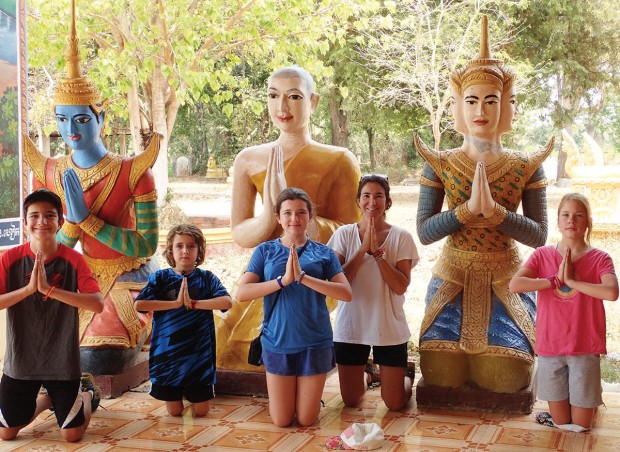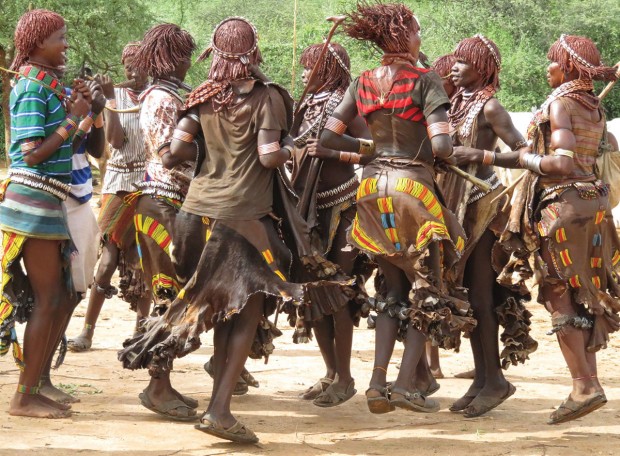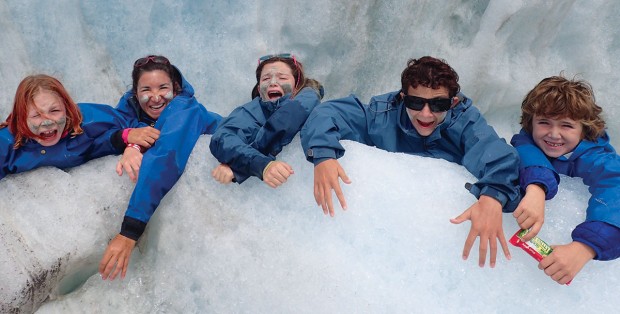Global family: the Germains


NAMASTE Ryker, Davis, Alegra, Dana and Ellery Germain (from left) harmonize their journey at a Buddhist temple near Battambang, Cambodia.
This is the first in a two-part series about families who take their education to other shores. This month, it’s the Germains; next month, it’s the Waters and the Kramers.
They call themselves the Germainiacs – and their trip began as a way to carry on their father’s memory, a means to move on and heal after his death. It ended up being a full-throttle, no-holds-barred embrace of life.
Dana and Rich Germain had often talked about taking a year-long sabbatical and travelling around the world with their kids. Both had lived and travelled abroad extensively, but this dream was never to be realized as he died of a heart attack, leaving behind four children and a world of pain. (See Tackling Grief by Cathy Gordon.)
Dana, a Lonely Planet-style backpacker who had circumnavigated the globe at 25 for the first time, was not one to let a good dream die. On Father’s Day, 2015, which was also son Davis’ 10th birthday, a year and a half after Rich’s passing, she and her four children – twins Alegra and Ryker, then 13; Ellery, 11, and Davis — shouldered their backpacks and began their journey.
Two years later with 28 countries and 111,000 miles behind them, they laughed at their scrapes with death, shared peak moments and pondered the ways the trip had changed them.
Alegra, then a moon-faced youngster, at 15 is now an award-winning photographer. The trip, she said, “started off as a way of healing – like, ‘We’re going to leave on this trip and be spontaneous, and it will be healing and processing.’ I don’t think that’s what it was in the end,” she said. “I think it was more about shaping our perspective on the world.”
That perspective included vast herds of wildebeest, AIDS orphans, tropical sunsets, coral reefs and glaciers, nights spent with African tribal people, and days spent rafting rivers and sailing the high seas.
“We didn’t want to hang out in Nairobi,” said Dana. “If we were going to be in Kenya, we wanted to be camping on the side of the hippo-filled river with bush showers.”
One night, three lions slept between their two tents, so they had a ranger with a rifle standing guard. “If you visualize the pages of National Geographic, that was truly how we lived,” said Dana.
Their initial course took them from Turkey to Greece and Croatia, just as Dana had planned on the big map back home with colored push-pins. But after that, they made it up as they went. Once they got to Croatia, Albania and Montenegro called to them. On to Africa, Oceania, Southeast Asia, then back to Africa again.
They were in Thailand, planning to head back to the Mediterranean, when a series of bombings hit the headlines – one in Brussels, one in Istanbul — so they decided to veer back into Africa. Ethiopia, Kenya and Tanzania were fabulous, but plans to continue their overland travel into Mozambique were thwarted by violence on the border.
“Can we go to Uganda?” suggested Alegra.
“Next day we went to the airport and said: ‘Five tickets to Entebbe,’ ” said Dana. The lush mountainous country turned out to be one of their favorites. They went rafting on the Nile, and camped in Kidepo Valley National Park, where Joseph Kony and the Lord’s Resistance Army once had their headquarters.
“It had been too dangerous for tourists for almost 20 years,” said Dana. “But the animals were plentiful and the tourists were negligible so it sounded like a good recipe for us.”

HAMER DANCERS Native Hamer women from Ethiopia's Lower Omo Valley perform a traditional dance for the tribe's bull-jumping ceremony. (Photo: Alegra Germain)
Another huge highlight was Ethiopia, where they rented a jeep and drove around for five weeks, beginning in Addis Ababa. They drove toward the east close to Djibouti and through the Muslim region, then up to the north and the sacred city of Lalibela, where medieval monolithic churches were carved into the stone, and Aksum, said to be the home of the biblical Ark of the Covenant. In the Lower Omo Valley in the south, the visited with tribes like the Mursi, who wear clay plates in their lips, and the Hamer, who have a rite of passage called bull jumping. “When a man wants to marry, they line up 15-25 bulls – and it’s an amazing ceremony, full of eating, drinking and dancing almost until a trance-like state, where the young man has to jump up on top of these bulls and run back and forth several times,” said Dana.
The women taunt the men, who lash the women’s backs with switches as a test of their strength and courage. By the end of the ritual, the women’s backs are dripping blood.
“When you think about this in the context of our lives, you wondered how either party could participate in something so primal and violent,” said Dana. “But in the cultural context we witnessed, it was an honor to have been included … and it was unbelievable to watch.”
Their guide’s mother invited them for dinner and to spend the night at her home – a hut made of mud and sticks with goatskins on the ground. It was one of the most memorable nights of the trip. “The kids are running around with local village children, I’m sitting around the campfire drinking their home brew, they’re singing and telling their stories….”
Finally they curled up among the goatskins. Around 3 a.m., Dana recalls, Davis elbowed her. “Mom, Mom, there’s a chicken standing on me,” he exclaimed.
“I can see him laying on his side and I can see by the silhouette of the moon that there is a chicken on him. I give the chicken an elbow and the chicken goes bawk and hops off him,” Dana said. “All night long, goats were wandering in and out, chickens, cows, the whole deal. When we wake up, there’s a baby goat spooning Davis.”
“Mom, there’s a goat right here,” said sleepy Davis.
“I said, ‘Isn’t that awesome?’”

ON THE EDGE Ellery, Dana, Alegra, Ryker and Davis hold on for dear life in Alegra's award-winning photo on the Franz Josef Glacier in New Zealand. The photo won them a free trip with Franz Josef Glacier Guides – a journey Dana considers one of her top three life experiences.
That was one of Davis’ best days. Ryker and Dana cite climbing the Franz Josef glacier on New Zealand’s South Island. Ryker will never forget the sight of the afternoon sun gleaming off a small avalanche; Dana will treasure the adventure of taking a helicopter to the top of the glacier with crampons and picks and full gear.
Ryker and Alegra got their scuba certification before they left so they could dive around the world. They went diving in French Polynesia, Australia, and in the Great Barrier Reef, which is rapidly dying off due to climate change, according to scientists. “It was sad; a lot of it was bleached and destroyed,” said Ryker.
He will never forget diving in Borneo. “There was a giant sea snake swimming in the water, and it was bigger than me!”
For Dana, sailing ranked high; they explored the Seychelles, Greece, French Polynesia, Australia and Croatia by sailboat.
The most astonishing, at least for Alegra, was the Great Migration in Tanzania.
They got to the Serengeti as the Migration was beginning; they boarded open-roof vans and were driving along the road when the driver stopped. “So we stand up and we see it – tens of thousands of wildebeests,” said Alegra. “The whole road is covered, with nowhere to go … wherever you looked they were there. The noise they made was overwhelming.”
“There were probably half a million of them,” added Dana. “We saw them once and we felt blessed. Then later, at the end of day, we saw them again.”
A white woman with four kids was sure to attract attention everywhere, but in Africa in particular, and people often asked questions.
The questions were always the same even if the language was different. “The first thing people would ask was: Are they all yours?” Dana said. The next thing that would happen is they’d start looking over my shoulder, and they’d say: ‘Where’s your husband?’”
“To which we would follow up, ‘He’s dead.’ And that was really awkward to say – they’d say ‘Oh, I’m so sorry!’ so we’re comforting them…. It got to the point where we’d been on the road for six months and we decided to try something different. “He’s in prison,” we’d say.
“People would look at us stone-faced. So we’d say, ‘Just kidding, he’s dead.’”
It’s not that they don’t care, said Dana. It’s just that after two years of processing, counseling, going through all the stages of grief, they were ready to move on.
“I was so tired of hearing that we weren’t a real family anymore. We were drowning. We left as a rag tag, injured bunch, but quickly realized that life is a gift. Rich would have wanted us to embrace life. He probably would have laughed,” Dana wrote in an e-mail after our interview.
“Knowing we were ‘processing’ was easier out of our regular environment and routine, especially since we were bombarded by the ‘awesomeness’ that we encountered each day. We did a tremendous amount of sharing and bonding. They are very clear now that family is a group of people who love each other.”
Another thing that people asked a lot was if they felt scared.
“I don’t think any of us were ever scared in the bush,” she said. “There was a certain level of adrenaline … and there were some genuinely scary moments.”
Alegra confessed to several terrifying encounters with aggressive baboons, however – as example, the one at the immigration checkpoint between Zimbabwe and Zambia and the one that got into their jeep with them in Tanzania.
“We had so many moments where we’d just look at each other and say, ‘Can you believe that just happened?’ Cobras, sharks, giant spiders – I said, ‘It’s just a baboon! Handle it!”
There were some truly terrifying moments, however. Like when Ellery disappeared in a market in Athens and they thought she might have been taken. Or like when Dana woke up in the middle of the bathroom floor in a pool of blood, her skull fractured, her jaw and nose shattered, and her teeth missing. She had passed out from a virulent form of food poisoning and hit the ground so hard, Davis thought she was dead.
Dana couldn’t believe the irony of it. After months of sleeping on the ground and in budget hostels, eating from mud huts and street vendors, they finally rented a comfortable room in a game preserve in South Africa. It was the least likely place on their journey to have a near-death experience.
Her two days in the hospital were excruciating. Not so much for the pain, but for the disappointment that the trip might have to end not on their terms.
At the second hospital she met with an oral surgeon named Pieter. “I’m just furious. I said, ‘This is not how the trip ends!” Pieter told her she was medically stable, that no surgery could take place until her broken bones healed. He whipped out his iPhone and showed her a photo of a patient. “A week ago, hyenas chewed his face off,” said Peter. “Look at this boy – he will wish he was dead. But you – look in the mirror. Your bruises will heal. You have your eyes, your nose can be fixed, your teeth can be replaced; you will be beautiful again.”
If what she really wanted was to travel on, he said, he could patch her up and make that happen. The consensus from the kids: “If you’re ok, we’re not ready to go home, and neither are you.”
They decided to rent a jeep and drive to Swaziland – “because why not, it’s right there,” she said. That’s when the second blow fell. A man accosted her at the ATM machine and robbed her of $1,500.
“I’m looking at the sky and saying, ‘Come on, give us a break! Why do you need me to go home so bad?’” She felt like they had finally taken control of their lives and their destiny and that they were once again being tested.
They ended up going to Swaziland with very little cash and a credit card. “We were given this test for a reason,” she said. “If we could make it in Swaziland for two weeks on nothing, we could make it anywhere.”
Their last stop was Capetown, South Africa – perhaps their favorite city.
“When our trip ended, it was on our terms – and it was super bittersweet,” said Dana. “We wanted that to be our final launching place as we headed home.”
It was a different family that landed back in Bellaire in August 2016. They’ve settled back into routines, reconnected with friends and are glad to be back in a formal school setting. Ellery goes to Trafton Academy, Davis goes to The Emery/Weiner School, and the twins go to Lamar High School. Dana has returned to her work marketing private equity funds.
But something has changed.
Partly it’s in the way they’ve integrated their loss. “Something terrible happened to my kids. They know that. But now they have seen what other people’s lives look like…. We all realized that everyone has ‘something.’
I think we collectively decided that while our ‘something’ wasn’t great, it could always be worse. We still had each other – and that was a lot.”
The trip allowed them to see the kindness of strangers from all walks of life. It also taught them how lucky they are to have been born where they were rather than in rural Africa, for example, where “the perils and challenges that can come with being a girl, then a woman, has been internalized,” said Dana. They have emerged with an articulate sense of global responsibility.
“All kids take things for granted,” said Dana, “but I think mine have taken a step back to really consider this. I see them as more globally sophisticated, less entitled, more appreciative, generally more aware and definitely more grounded.”
It was a journey worthy of the big screen – and indeed, it may just happen. Dana’s working with a screenplay coach in New York, and when Dana decides, things happen.
“I think the story is something like: You can’t choose what happens to you; the only choice you have is how you respond, how you take control back,” she said. “You lose your husband, you get sick, you lose your job … everyone has big life challenges.
“Yes, that will be the way the story goes…. It’s reminding people they really are the captain of their life.”
Want more buzz like this? Sign up for our Morning Buzz emails.
To leave a comment, please log in or create an account with The Buzz Magazines, Disqus, Facebook, or Twitter. Or you may post as a guest.


